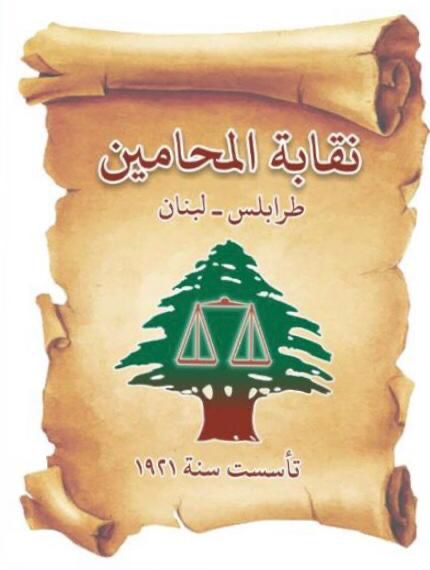Lawyering at the Mercy of Social Norms: Discipline or Subjugation?

On 19 December 2022, the Tripoli Bar Association’s Disciplinary Council issued a decision prohibiting Khalid Merheb from practicing law for four months. The reason: his comments on Minister of Interior Bassam Mawlawi’s decision to ban the “promotion of sexual deviance” at the behest of Dar al-Fatwa, the state-sanctioned authority governing the religious affairs of the Sunni sect. The disciplinary decision cited two statements that Merheb published on his Facebook page.
The first statement read, “Sooner or later, civil marriage will be legalized, and gay people will get their rights, you corrupt, detestable, loathsome [person]. Aware of the theft and corruption yet silent”. It was attached to a picture of Mufti of the Republic Abdul Latif Derian [whose last name matches the term for “aware” that Merheb used]. While Merheb said that these phrases referred not to the mufti personally but to the entire patriarchal system, the Disciplinary Council deemed their placement over the mufti’s picture a clear indication to the contrary. It argued that rather than criticizing the mufti’s actions, the statement delivers personal insults that go beyond legitimate critique and the duty of propriety, and constitute slander and defamation that indignify him. The council also emphasized that the statement impinges on what the mufti represents as the supreme Islamic authority or symbol. The decision’s conclusion suggests that this additional point played a role in convincing the council and determining the punishment, for the council deemed it evidence of Merheb’s intent to blaspheme (a separate crime) and his incitement of partisan and social strife.
The second statement read, “Apply the teachings of the mythological historical books in which you believe to yourselves, but you have no right to force them on others who do not believe in them”. The decision suggests that the council dwelled long on this post. It stated, “When Merheb was asked what he meant by divine books and whether he meant the Quran and Bible, he responded that he meant all philosophical books and the Bible and Quran […] Therefore, the referred lawyer goes to extremes in his deviation from the ethics and rules of the profession, at times attacking the mufti’s person and at other times attacking divine books by labeling them superstition and mythology”. The council argued that this confirms Merheb’s determination to blaspheme and therefore his deviation from professional ethics.
In his defense, Merheb argued that the prosecution was beyond the jurisdiction of the Bar Association’s disciplinary authority as it aimed to penalize his personal beliefs and opinions, not how he practices his profession. However, the council responded that “the referred lawyer is not being questioned about his personal beliefs; rather, [the council’s] role is confined to [examining] the extent to which the lawyer adheres to the conduct and ethics of the profession”. In other words, lawyers may believe whatever they like, but the council may exercise its disciplinary authority to assess their adherence to professional ethics as soon as they openly express these beliefs. A lawyer is obliged to “always have a fine record and good reputation in his society”, and these two attributes are “intrinsic to the lawyer figure both during his practice of the profession and beyond it in the stereotypical image projected to others”. Thus, the council seems to be declaring that its authority extends to holding a lawyer accountable for any statement or action, even outside the bounds of professional practice, that could harm their record and reputation as it would impact the reputation and image of lawyers collectively. Hence, the Bar Association president has an “obligation to defend the Bar Association from any indignity perpetrated by a lawyer in or beyond his professional work and from any action that demeans the profession and has negative repercussions on the association’s dignity”.
From these angles, the council’s decision is a chain argument for the use of disciplinary authority to confine and subordinate lawyers, in their statements and actions, to social axioms that may not have anything to do with the law profession and the ethics and conduct it requires. Even more grave, the council had no reluctance – in a show of appeasement to Dar al-Fatwa and the dominant forces – about invoking the concept of sacrality and accusing Merheb of blasphemy without any regard for the subsequent risks in a region where such accusations have precipitated murder. This danger adds to the severe punishment that the council selected without bothering to examine whether it is proportional to the gravity of the infraction, arguing that it has “absolute” discretion to decide the penalty.
This is what we shall detail in this article.
Defining Sacrality Broadly: The Mufti is a Religious Symbol, and Talk of Religious Myths is Blasphemy
Firstly, the Disciplinary Council broadened the concepts of “the sacred” and “blasphemy”, thereby placing unjustified restrictions on freedom of belief and expression.
This is evident, firstly, from the decision’s emphasis on the notion that impinging on the mufti is not only an impingement on his person but also on the Islamic religion because he is the highest Islamic authority and a religious symbol. Thus, any attack on the mufti is an attack on the sect he represents and therefore incites social strife. While the council’s stance is in line with previous unsuccessful attempts to amend the Penal Code to broaden the concept of profanity to include impingement on religious leaders and their icons (including the amendment adopted by the Administration and Justice Committee’s subcommittee in 2002), it also matches the knee-jerk statements by religious and political authorities also calling any attack on the mufti an attack on the entire Sunni sect. Needless to say, conflating clerics with religion sanctifies people elected or appointed by earthly authorities, paving the way for freedom of expression to be unjustifiably restricted.
Making matters worse, the council dwelled in both its investigation and decision on Merheb’s second post – which described religious books as mythology – and deemed it evidence of his determination to blaspheme. This stance reflects strict puritanism and ignorance of the history of religions. Since the dawn of time, what constitutes a religion to those who embrace it constitutes a myth to those who do not. Thus, the gods of the Ancient Egyptians, Sumerians, Babylonians, Phoenicians, and Greeks, for whom temples were erected through the sacrifices of their believers, are now all considered mythological. Likewise, polytheistic gods widely worshiped today are considered myths by monotheists. Christ’s status as God’s son is a mere myth to Muslims, and Muhammad’s prophethood is a myth to non-Muslims. The genesis narrative is a myth according to scientific theories on which there is no room to elaborate here. From this angle, the mere declaration that freedom of belief is absolute in Article 9 of the Constitution means that the freedom of every person to describe religions they do not follow as myths must necessarily be recognized. At its core, this recognition embodies the Quranic principle that there is no coercion in religion [la ikraha fi al-din]. When the Disciplinary Council insists otherwise, it violates constitutional freedom and departs entirely from the ethics of the law profession, which require that lawyers be the foremost defenders of public freedoms, not violate them. Moreover, the council is attempting to one-up the Quran itself by insisting – contrary to its precepts – that coercion in religion is perfectly fine.
The Lawyer Confined to Social Acceptability
Worse still is the justification that the Disciplinary Council gave for taking the case, namely that Merheb’s blasphemy and attack on religious dignitaries not only deprives him of his “fine record and good reputation in his society” but also harms the Bar Association’s reputation and the lawyer stereotype. In other words, the Bar Association derives its disciplinary power in this case from its duty not only to enforce specific conduct on lawyers to preserve their “good reputation” but also to protect its own reputation and the lawyer stereotype. Under this pretext, the Bar Association apparently allows itself to control lawyers’ beliefs, opinions, and perhaps lifestyle and – implicitly – to restrict constitutional freedoms that it is supposed to safeguard, not destroy.
The effect is the enforcement of a specific paradigm of lawyer and lawyer attributes: one who adheres and submits to social norms to maintain their “fine record” and “good reputation”. This paradigm excludes all others, including the paradigm of the lawyer who advocates for unpopular values or rights and freedoms violated in the name of traditions, or – more generally – the lawyer who advocates for socially and perhaps legally disadvantaged groups. These paradigms all lie at the heart of the law profession and reflect perhaps its most noble aspects. It is well and good for lawyers to defend socially recognized rights, but what about their function of defending rights rejected by the dominant or prevailing forces or whose mere defense is held against them? Should not the Bar Association, which exists to guarantee everyone’s right of defense, revere rather than penalize the brave lawyers who defend such unpopular rights? From this angle, does mere talk about wanting to impose a lawyer stereotype not negate the plurality of this profession and its paradigms and orientations, which is a fundamental safeguard of the plurality and democracy of society?
And so we return to the question posed in the headline: Discipline or subjugation? Did the Disciplinary Council discipline a lawyer for breaching professional ethics? Or did it exploit the authority entrusted to it in order to enforce the uniform lawyer paradigm that the Bar Association desires, namely a lawyer who regurgitates and adheres to all social axioms in order to preserve their reputation and the reputation of their colleagues?
A Disproportionate Punishment
Even more troubling, the Disciplinary Council explicitly emphasized that it has an “absolute right” to determine Merheb’s punishment. It also claimed the right to enforce the punishment as soon as he was notified of the decision, without waiting for the window for challenging it before the competent court (the North Lebanon Court of Appeal) to elapse or even allowing such a challenge to suspend it, as required by the Code of Civil Procedure. Thus, here too, the council appeared to contravene the legal principles that should have guided it. In this regard, we shall merely mention the ruling that the Beirut Court of Appeal issued on 25 June 2012, which reduced the punishment that a disciplinary council in the Beirut Bar Association handed down on one lawyer (Muhammad al-Maghrebi) from a ban on practicing to just a warning because it found the original punishment disproportionate. The court also stressed that the Disciplinary Council had violated the Code of Civil Procedure when it deemed its ruling to be effective immediately as the law alone determines which decisions are executed upon issuance and not suspended by appeal.
Moreover, the council had no qualms, in a show of courtesy to Dar al-Fatwa and the dominant forces, about including in its decision grounds that put the lawyer in imminent danger, adding to the harsh punishment it selected. While it could have stopped at the personal insult to the mufti and issued its decision on that basis, it opted to transform the issue from an attack on this figure to blasphemy in order to give more legitimacy to the punishment it wanted to impose. Thus, it made another misstep, putting a Bar Association member in real danger by endorsing the notion that he attacked religion.



